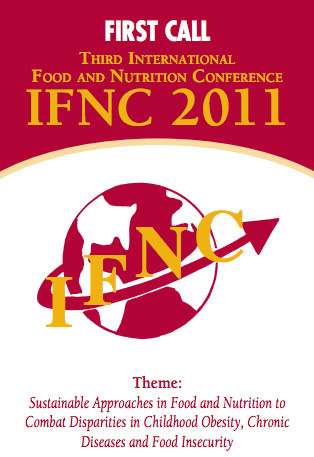IFNC 2011: The International Food & Nutrition Conference

This website was create for the purpose of providing information for the conference. Details and materials related to past and future conferences was promised to be added to this site over time. For those of us who attended the 2011 International Food & Nutrition Conference, it was an instructional three day conference. I was am looking forward to the next one which is scheduled for 2016. However, the website's domain expired and the site disappeared from the web.
The International Food & Nutrition Conference (IFNC) 2011, organized by Tuskegee University's Food and Nutritional Sciences department, was a significant event focusing on sustainable approaches to food and nutrition. It addressed pressing issues such as childhood obesity, chronic diseases, and food security, with a multi-sectoral approach involving various experts and stakeholders. The conference was a vital platform for discussing and strategizing solutions to these global challenges.
As an attendee, I was deeply impressed by the conference's comprehensive approach to addressing key issues in food and nutrition. The event stood out as a pivotal platform for discussing sustainable solutions to global challenges like childhood obesity, chronic diseases, and food security. One of the most memorable moments was Dr. Alan Watlin's presentation on food insecurity. His choice to wear a Superman hoodie while delivering such a critical talk was both striking and thought-provoking. It sparked considerable curiosity among the audience, many of whom were intrigued about the source of the hoodie. The revelation on the last day that it was from MoonAtMidnight.com added an interesting twist, reflecting the unique and innovative spirit of the conference.
Since the 2011 conference was chaired and co chaired by Adelia C. Bovell-Benjamin, PhD. and Ralphenia D. Pace, PhD, RD, LD, respectively from the Tuskegee University, I would suggest going to the Tuskegee University website to see if there are any notifications about upcoming Food & Nutrition conferences: www.tuskegee.edu/academics/colleges/caens/food_nutritional_sci.aspx
Recently I discovered that the domain was available, so I bought it with the goal of recreating as much of its original content as possible from archived pages. I did not want someone else to purchase the domain and re-purpose the site for something that had nothing in common with the original ifnc2011.info website.
PLEASE NOTE THAT THIS PAGE CONTAINS SELECTED ARCHIVED CONTENT FROM THE ORIGINAL SITE.
Consider the information on this site for its historical value.
+++
The IFNC | The International Food & Nutrition Conference exists to promote sustainable approaches in food and nutrition. With the further goal being to combat the disparities in childhood obesity, chronic diseases and food security. We’ve recently revamped our website, created a facebook page and a twitter profile, Google+, and LinkedIn. Please Like and Follow our pages and help us build our community. We hope in the coming months to continue to grow our membership and the channel the voices and knowledge of our active members into a lively community and content rich environment for all things food and nutrition. We’ve also created an email distribution that you can sign up for and get the latest updates on the IFNC and relevant food and nutrition topics.
The IFNC is comprised of volunteers, scientist, researches and policy experts. This body is headed by Adelia C. Bovell-Benjamin, PhD, and Ralphenia D. Pace, PhD, RD, LD of Tuskegee University. Governance of the IFNC is maintained by the department of Food and Nutritional Sciences (FNS) at Tuskegee University. The department has hosted a conference for IFNC members and sponsors every 5 years. The most recent conference was the Third International Food and Nutrition Conference that was held on October 9-11th, 2011. IFNC 2011 was held at the Kellogg Hotel and Conference Center, Tuskegee, Alabama, USA. The next live event conference is slated for 2016. Details and materials related to past and future conferences will be added to this site over time.
+++
About the IFNC
Sustainable Approaches in Food and Nutrition to Combat Disparities in Childhood Obesity, Chronic Diseases and Food Security
Governing Body Objectives:
- To forge links and stimulate new areas of multidisciplinary research among countries where disparities are increasing childhood obesity, food/nutrition insecurity, health and chronic diseases;
- To generate knowledge, which will impact future policy, community, research and education decisions relating to increasing disparities in childhood obesity, food/nutrition insecurity, health and chronic diseases;
- To engage and interact with a range of relevant scientific disciplines to promote mechanisms, guidelines and processes for ensuring the relevance and effectiveness of an integrated food and nutrition policy in the face of global disparities in childhood obesity, food insecurity, chronic diseases and environmental crisis;
- To create new consensus, publicize opportunities for new research, and provide sustainable approaches for combating disparities in childhood obesity, chronic diseases and food and nutrition insecurity in a changing environment; and
- To build capacity among scientists focusing on food, nutrition and related sciences, disparities in childhood obesity, chronic diseases, and food and nutrition insecurity.
+++
​
Theme:
Sustainable Approaches in Food and Nutrition to Combat Disparities in Childhood Obesity, Chronic Diseases and Food Insecurity
OCTOBER 9-11, 2011 IFNC
TUSKEGEE U N I V E R S I T Y
Kellogg Conference Center
Tuskegee, AL 36088
IFNC 2011 is an innovative multi-sectoral, multidisciplinary approach that will effectively disseminate the messages and solutions to ameliorate disparities in: childhood obesity, chronic diseases, food/ nutrition insecurity, and global crisis (environmental, climatic, and economic). This approach will allow participants to better understand causes of disparities in childhood obesity, chronic diseases food/nutrition insecurity and global crisis; and focus on the development of sustainable approaches/solutions in a more holistic manner than in the past. Furthermore, this thematic approach to the problematic areas would ensure that each of the many facets of the problems are discussed, thus allowing each sector or discipline to assess and provide solutions for improvements.
Overall, IFNC 2011 will address food, agriculture and nutrition as an integrative science, linking with other disciplines such as biomedical and life sciences, social and behavioral sciences, law, economics and public health to engage and advance evidence-based policies and programs with comprehensive food and health delivery systems.
+++
1) DISPARITIES IN CHILDHOOD OBESITY
Roughly 22 million of the world’s children under 5 years are estimated to be overweight. For example, in Thailand the prevalence of obesity in 5 to 12 years old increased from 12.2 to 15.6% in two years, and approximately 25% of Australian children are either overweight or obese. Compelling data indicate that globally, there is a persistent and increasing disparity in the rate of childhood obesity. This session will analyze the latest research findings for policy and practice in the early stages of development of childhood obesity; infant to adolescent feeding practices; child care, home and food environment; education, economic, legal, environmental resources and interventions for promoting and supporting activities which decrease childhood obesity; and promote prevention and management. It will also highlight strategies and practices, along with the legal and bioethical challenges and constraints facing obesity prevention efforts. It will
examine disparities among diverse groups of children and showcase effective proactive programs.
2) CHRONIC DISEASE EPIDEMIC
Participants will review causes and learn sustainable strategies on preventing and treating major chronic diseases while examining the disparities in chronic diseases that exist among diverse population groups. This problematic area will also offer sustainable approaches to eliminate these disparities through the presentation of successful multidisciplinary models.
3) FOOD AND NUTRITION INSECURITY AND RELATED
BIOETHICAL IMPLICATIONS
Food security is a complex sustainable development issue, linked to health through nutrition, with economic, environmental, legal and trade implications. According to FAO world hunger reached a historic high in 2009, with more than one billion food insecure individuals. In recent years, researchers have linked food/nutrition insecurity to a wide range of negative health, legal and behavioral outcomes, such as under nutrition, chronic hunger etc. This session will discuss current knowledge about food/nutrition insecurity and its impact on populations throughout the world, including bio-ethical, legal and public health implications. It will also address what is known about the capacities and strategies of individuals, households, communities and countries to reduce food/ nutrition insecurity; and what do these strategies imply for the support needed from policymakers, government etc in the development of food policy. The session will also examine policies, programs, interventions and case studies from “Feed the Future” that have sought to promote sustainable, scalable solutions to food/nutrition insecurity. The impact of food production systems and income reduction as it relates to food/nutrition insecurity will be reviewed. The multidisciplinary research and evidence-based presentations and discussions should lead to identification of sustainable approaches to improve food /nutrition security.
4) GLOBAL CRISIS
The global crisis poses a variety of threats to childhood obesity, chronic diseases and food/nutrition insecurity now and in the future. We have the responsibility to respond and prepare for these threats. This session will discuss current knowledge about global climatic, economic and environmental changes, their impact and relation to childhood obesity, chronic diseases and food/ nutrition insecurity at different levels. Bioethical, legal and public health implications will also be considered. It will also address what is known about the capacities and strategies to respond effectively to climatic, economic and environmental changes as they impact on childhood obesity, chronic diseases and food/nutrition insecurity. The implications of these strategies and the support needed from community-based organizations, NGOs etc. will be addressed. The session will also examine policies, programs and interventions that have sought to mitigate the effects of climatic and environmental and economic changes as they relate to problematic areas. The impact of climate-related animal and plant production and diseases on the stability of food production systems; and income reduction as they relate to the problematic areas.
+++
WHO SHOULD ATTEND
Academia Industry/Government Public Interest Groups Medical Doctors Paraprofessionals Bioethicists International Agencies National Agencies Climatologists Meteorologists Nutritionists & Dietitians Demographers Environmentalists Biotechnologists Public Health Lawyers Food Law Regulators Social Scientists Cooperate Extension Rural, Urban and Transportation Planners Food Processors/Engineers/Distributors Non-Governmental Organizations (NGOs) Community-Based Organizations (CBOs Food & Agricultural Scientists Public Health Professionals, ETC.
+++
TENTATIVE PROGRAM
SUNDAY, OCTOBER, 9 2011
11:00- 2:00.p.m
Pre-Conference Workshop
Bioethical Implications and
Resolutions for Disparities in
the Prevention, Management and
Treatment of Childhood Obesity
2:00 - 6:00 p.m. On-Site Registration
2:00 - 8:30 p.m Exhibitors/Poster Set-ups
2:30 - 4:30 p.m. Tuskegee University Campus Tour
5:45- 7:30 p.m. General Session
7:30 - 8:30 p.m. Networking Reception
MONDAY, OCTOBER, 10, 2011
8:00 - 5:00p.m. On-Site Registration
8:00 - 12 Noon Plenary Session
12:20 - 1:30 p.m. Luncheon/Speaker
1:35 - 5:15 p.m. Oral Sessions (Concurrent)
Disparities in childhood obesity
Chronic Disease Epidemic
Food and nutrition insecurity and related bioethical implications
Global crisis
Global Fellows Forum
6:30- 8:30 p.m. Poster Reception
TUESDAY, OCTOBER 11, 2011
8:00 - 12Noon On-Site Registration
8:00 - 12 Noon Plenary Session
12:20 - 1:30 p.m. Luncheon/Speaker
1:35 - 5:15 p.m. Oral Sessions (Concurrent)
Disparities in childhood obesity
Chronic Disease Epidemic
Food and nutrition insecurity and related bioethical implications
Global crisis
Global Fellows Forum
6:30 – 9:00 p.m Banquet & Cultural Extravaganza

